Scientia Sexualis
October 5th—March 2nd, 2025
Curated by Jennifer Doyle and Jeanne Vaccaro
Institute of Contemporary Art, Los Angeles
1717 E 7th St, Los Angeles, CA 90021
For Scientia Sexualis our Street Transvestites Action Revolutionaries Protest Font is feaured in the exhibition title, in the catalog that accompanies the exhibition and inmany of the accompanying design for the exhibition related programs and materials. The typeset lettering is designed from the banner of the organization started by Sylvia Rivera and Marsha P. Johnson. As a trans Latina, Sylvia Rivera was an outlier among white gay men and lesbian feminists. In 1970, she cofounded the militant group and youth shelter STAR (Street Transvestite Action Revolutionaries) with African American trans activist Marsha P. Johnson (1945-–1992)), providing vulnerable and homeless trans teenagers with food and clothing."
![]()
![]()
![]()
Scientia Sexualis is an ambitious group survey of contemporary artists whose work confronts, dissolves, and reimagines sex and gender within the scientific apparatus. Organized by Jennifer Doyle (Professor of English, University of California, Riverside) and Jeanne Vaccaro (Assistant Professor of Transgender Studies and Museum Studies, University of Kansas), the exhibition will take place in fall 2024 as part of the ambitious collaboration across arts institutions throughout Southern California led by the Getty known as Pacific Standard Time, and will be accompanied by a major scholarly publication produced by ICA LA.
![]()
Scientia Sexualis centers research-driven interventions into raced and gendered assumptions that structure scientific disciplines governing our sense of the sexual body. The artists in this exhibition bring attention to the material, conceptual, and psychic forms of the lab and the clinic as aesthetics that operate across scientific and artistic discourses. The exhibition catalogue will feature new writing by leading interdisciplinary scholars who will map key concepts (sex, race, Indigeneity), materials (instruments, specimens, biomatter), and disciplines (psychiatry, anthropology, reproductive medicine) that the artists engage through their work. Together with the catalogue and related programming, Scientia Sexualis aims to examine and reconfigure the relationship between art and science and, in turn, to create an alternative access point to the history of science where sex, gender, and pleasure are concerned.
![]()
Scientia Sexualis takes its title from Michel Foucault’s landmark text, The History of Sexuality, Vol. 1 (1976), in which Foucault describes the nineteenth-century development of a “scientia sexualis”—the clinical pursuit of a “uniform truth of sex” as evidenced by an endless scanning of the body and a relentless cataloging of sexual types and deviations. In contrast, over the past 35 years, feminist and queer artists have approached sex and gender as sources of experimentation, knowledge production, medical management, and biotechnical information, resulting in a wide range of works that address difficult subjects such as the origins of modern gynecology and its ties to the torture of enslaved women; the pathologizing of the sexual body; the entanglement of colonization with sexual violence; and the nonconsensual gendering of trans and intersex people. The artists featured in Scientia Sexualis not only explore these painful histories through their artistic output, but they also work from its wake, reclaiming and redeploying scientific discourses to produce speculative technologies of transformation, map embodied forms of knowledge, and radicalize practices of healing and care.
![]()
While several major museum exhibitions have addressed issues of gender, sexuality, and representation, Scientia Sexualis is distinct for the coalitional possibilities it generates between Black, feminist, trans and decolonial approaches to these subjects. The project is intentionally heterogenous, situating Black feminist work that confronts the abuse of Black women’s bodies alongside decolonial interrogations of a settler colonial anthropology, trans reclamation of medical practices, and intersectional feminist interventions in reproductive medicine. As a whole, the exhibition addresses the aftermath of our encounters with scientific discourses and institutions as the featured artists surface the contradictory energies that circulate through the lab and the clinic, the library and the archive, exploring and re-constructing frameworks that tell us not only what sex and gender are, but what a body is and can be.
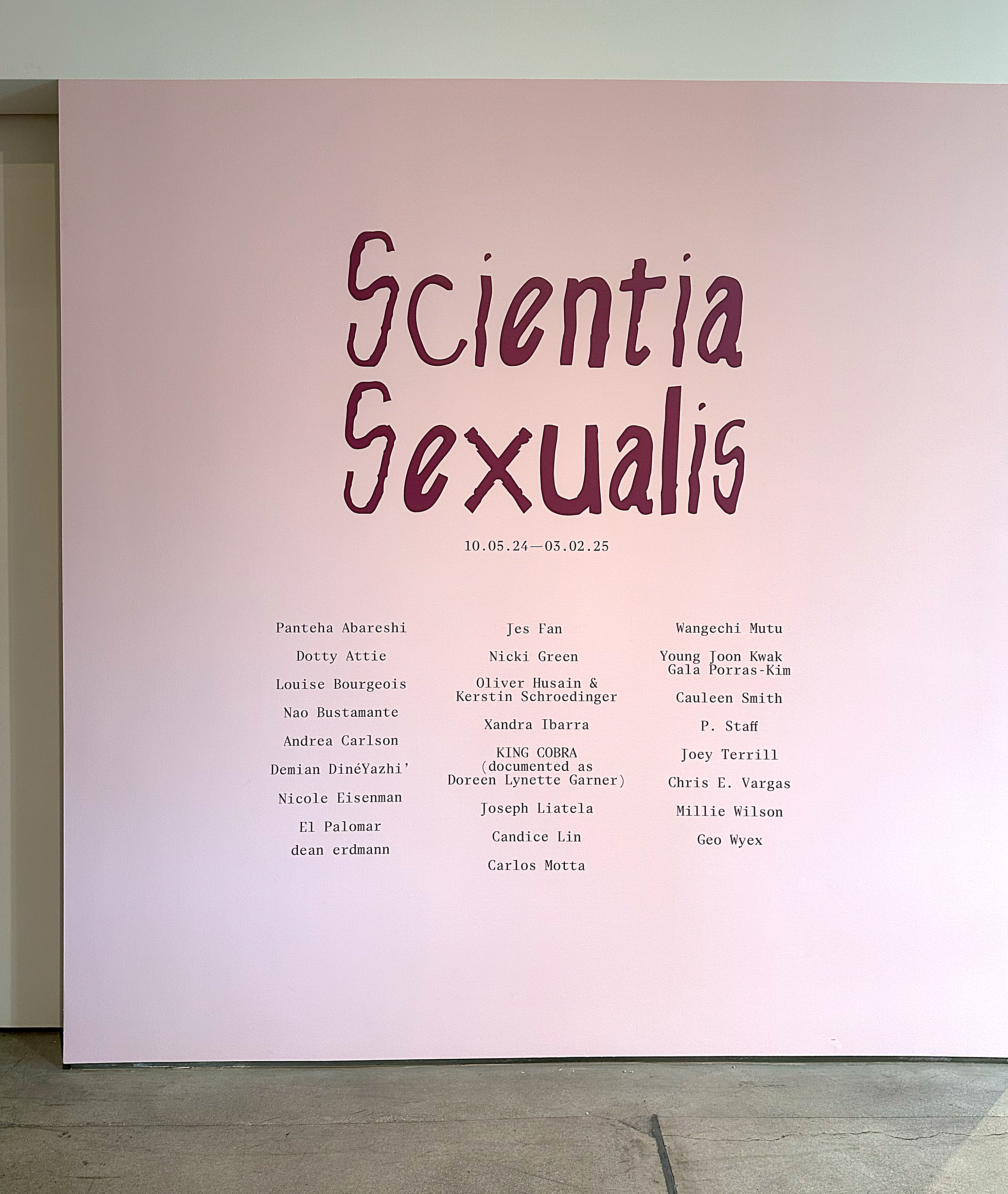


Scientia Sexualis is an ambitious group survey of contemporary artists whose work confronts, dissolves, and reimagines sex and gender within the scientific apparatus. Organized by Jennifer Doyle (Professor of English, University of California, Riverside) and Jeanne Vaccaro (Assistant Professor of Transgender Studies and Museum Studies, University of Kansas), the exhibition will take place in fall 2024 as part of the ambitious collaboration across arts institutions throughout Southern California led by the Getty known as Pacific Standard Time, and will be accompanied by a major scholarly publication produced by ICA LA.

Scientia Sexualis centers research-driven interventions into raced and gendered assumptions that structure scientific disciplines governing our sense of the sexual body. The artists in this exhibition bring attention to the material, conceptual, and psychic forms of the lab and the clinic as aesthetics that operate across scientific and artistic discourses. The exhibition catalogue will feature new writing by leading interdisciplinary scholars who will map key concepts (sex, race, Indigeneity), materials (instruments, specimens, biomatter), and disciplines (psychiatry, anthropology, reproductive medicine) that the artists engage through their work. Together with the catalogue and related programming, Scientia Sexualis aims to examine and reconfigure the relationship between art and science and, in turn, to create an alternative access point to the history of science where sex, gender, and pleasure are concerned.
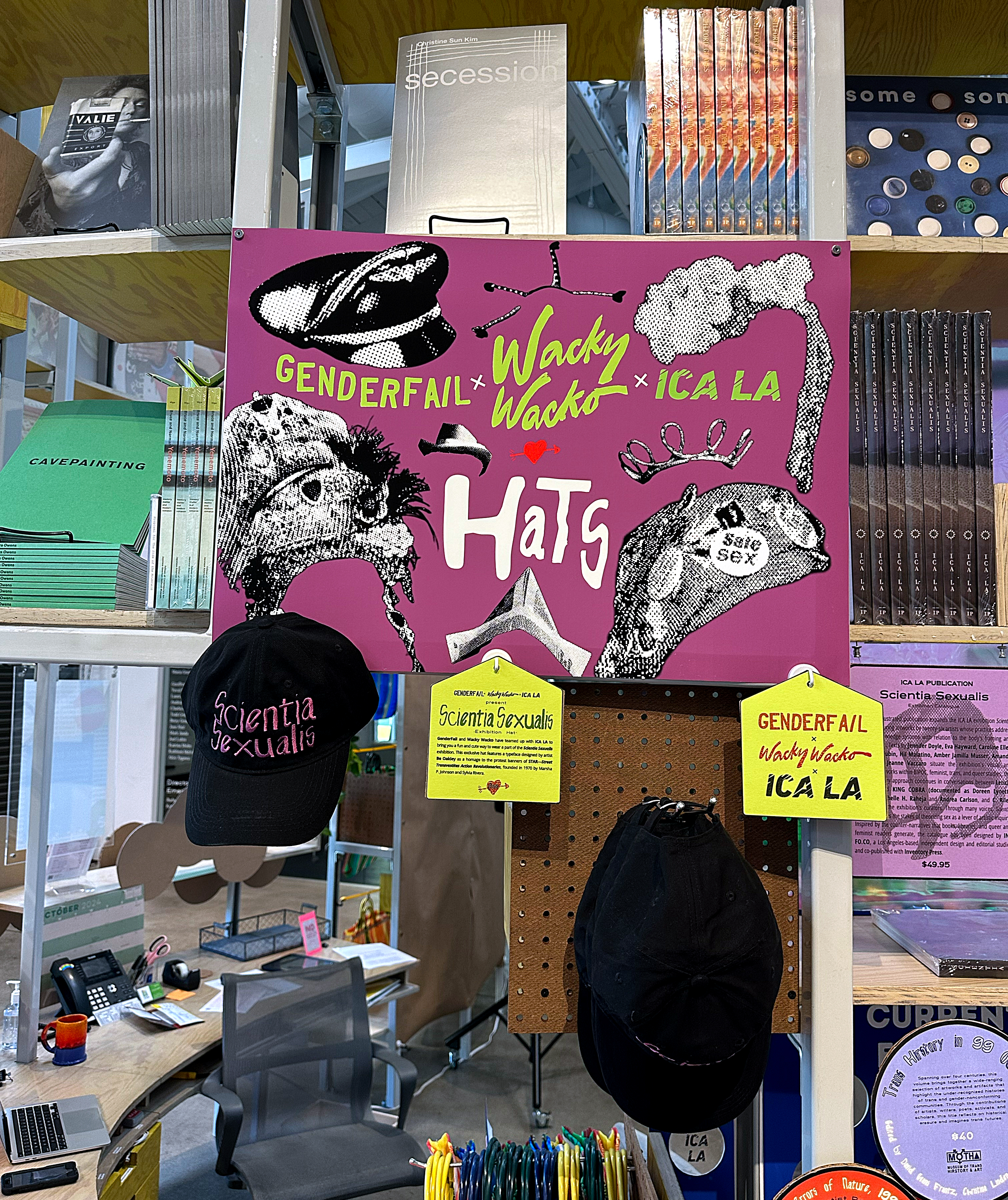
Scientia Sexualis takes its title from Michel Foucault’s landmark text, The History of Sexuality, Vol. 1 (1976), in which Foucault describes the nineteenth-century development of a “scientia sexualis”—the clinical pursuit of a “uniform truth of sex” as evidenced by an endless scanning of the body and a relentless cataloging of sexual types and deviations. In contrast, over the past 35 years, feminist and queer artists have approached sex and gender as sources of experimentation, knowledge production, medical management, and biotechnical information, resulting in a wide range of works that address difficult subjects such as the origins of modern gynecology and its ties to the torture of enslaved women; the pathologizing of the sexual body; the entanglement of colonization with sexual violence; and the nonconsensual gendering of trans and intersex people. The artists featured in Scientia Sexualis not only explore these painful histories through their artistic output, but they also work from its wake, reclaiming and redeploying scientific discourses to produce speculative technologies of transformation, map embodied forms of knowledge, and radicalize practices of healing and care.
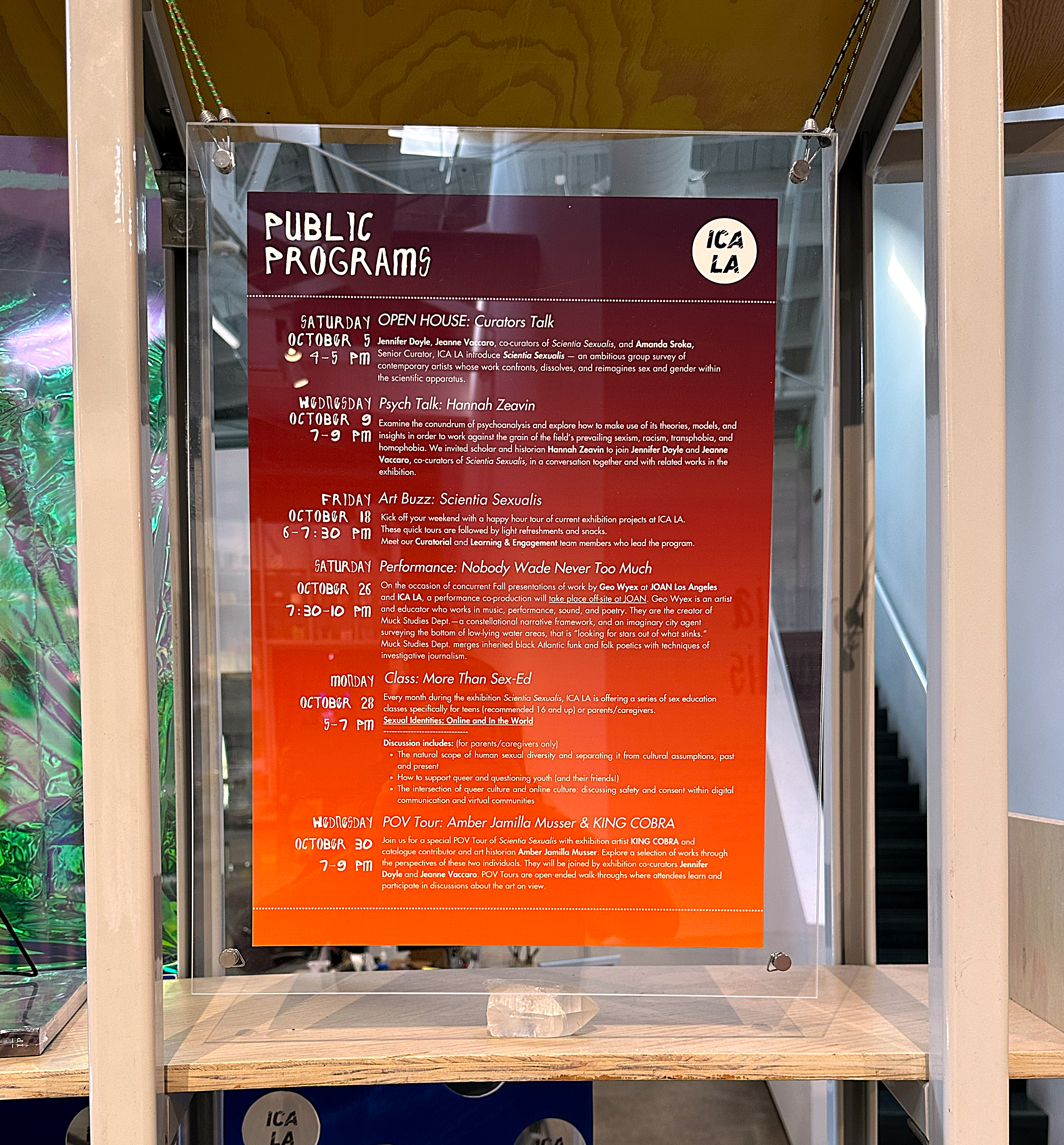
While several major museum exhibitions have addressed issues of gender, sexuality, and representation, Scientia Sexualis is distinct for the coalitional possibilities it generates between Black, feminist, trans and decolonial approaches to these subjects. The project is intentionally heterogenous, situating Black feminist work that confronts the abuse of Black women’s bodies alongside decolonial interrogations of a settler colonial anthropology, trans reclamation of medical practices, and intersectional feminist interventions in reproductive medicine. As a whole, the exhibition addresses the aftermath of our encounters with scientific discourses and institutions as the featured artists surface the contradictory energies that circulate through the lab and the clinic, the library and the archive, exploring and re-constructing frameworks that tell us not only what sex and gender are, but what a body is and can be.

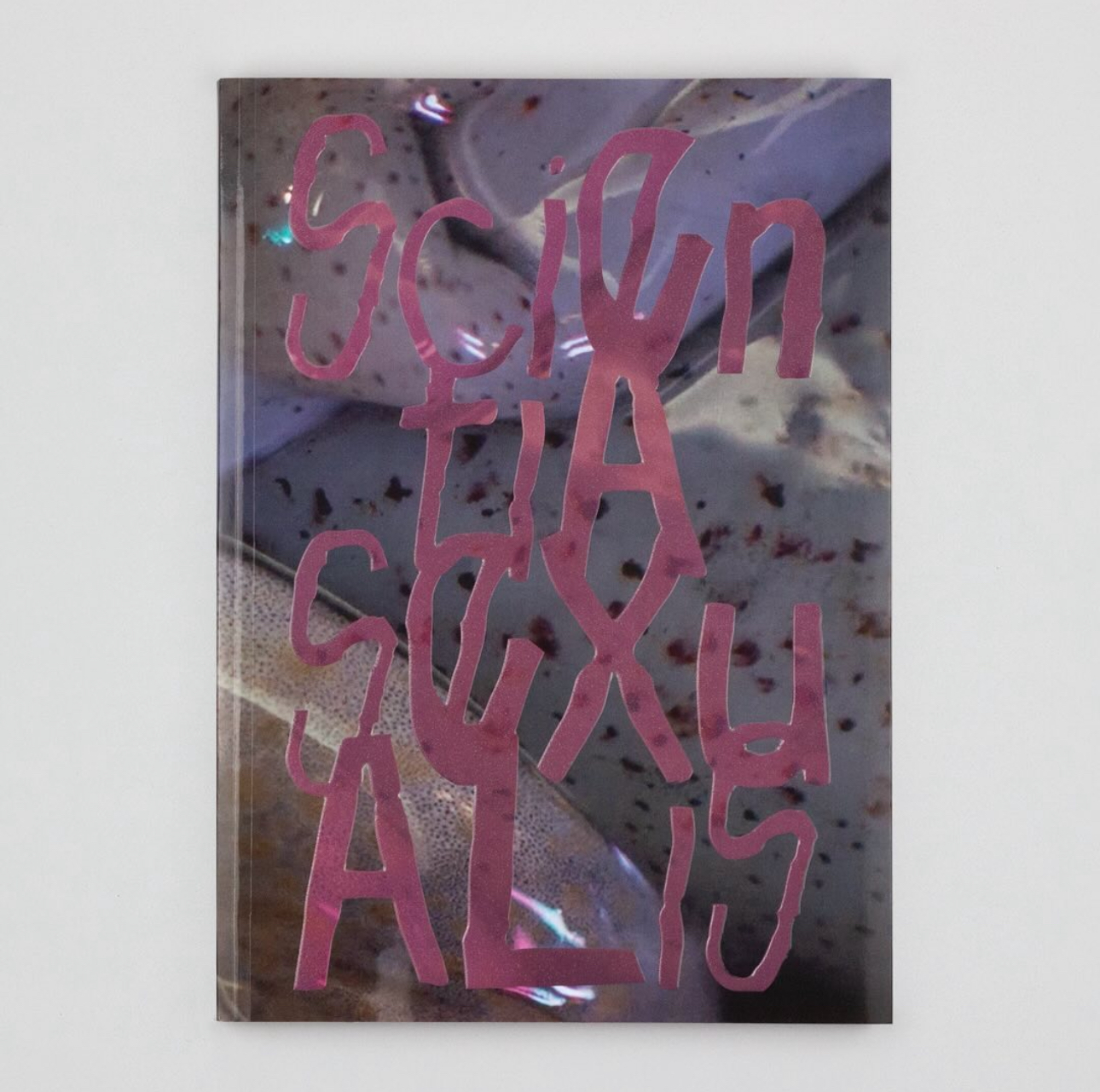
Scientia Sexualis
BUY HERE
Edited by Jennifer Doyle and Jeanne Vaccaro
11 × 15 inches, 224 pages, softcover
ISBN 978-1-941753-61-3
Design by IN-FO.CO
Cover and Title STAR Protest font by Be Oakley of GenderFail
Co-published by Institute of Contemporary Art, L.A. & Inventory Press
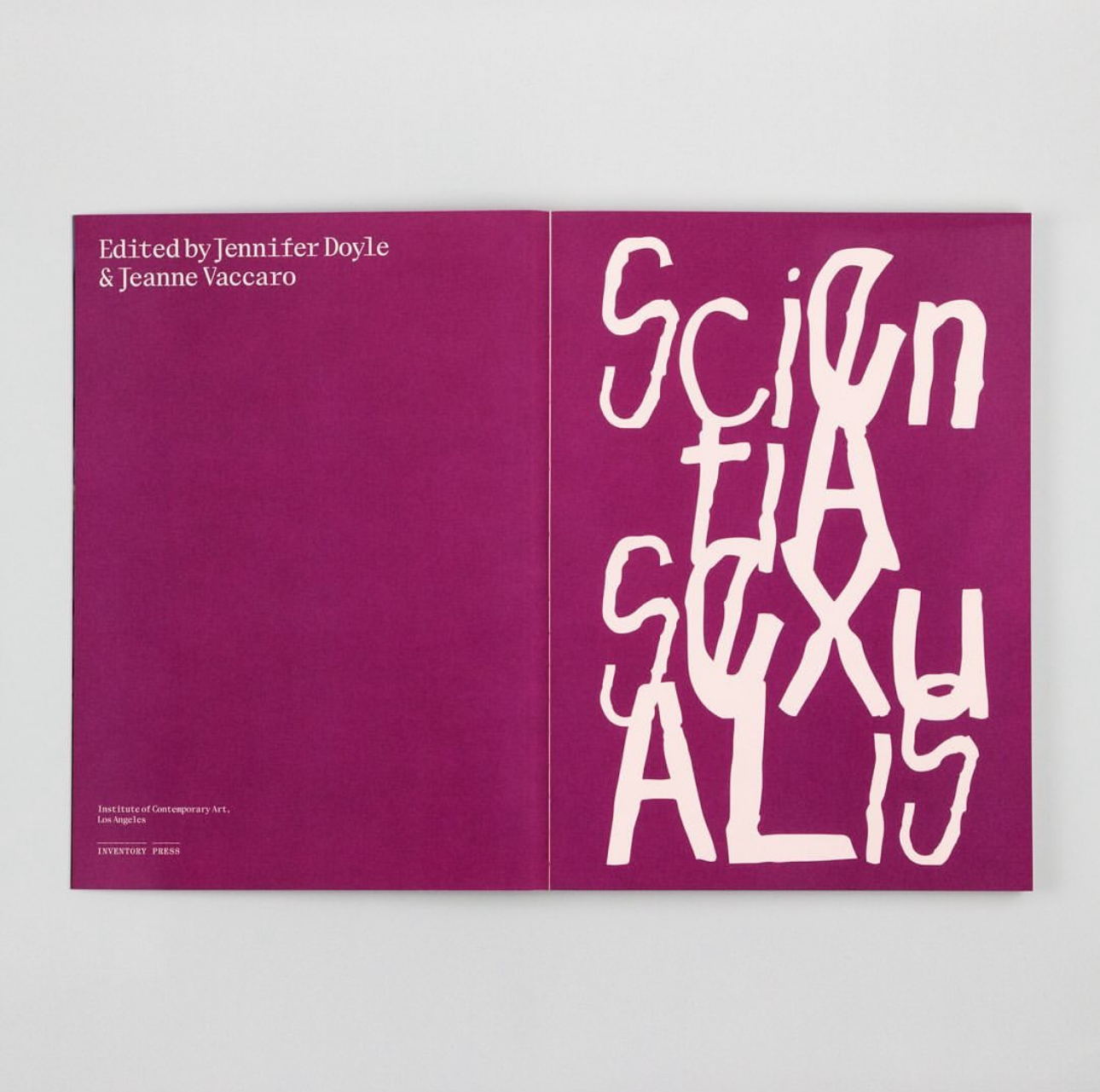
This richly illustrated companion to the ICA LA exhibition Scientia Sexualis features artworks by twenty-six artists whose practices address, dissolve, and reimagine sex and gender within the apparatus of science—past and present. Their works tackle and transform the origins of modern gynecology and its ties to the torture of enslaved women, the pathologization of the sexual body, the entanglement of colonization with sexual violence, and the nonconsensual gendering of trans and intersex people.

Texts by Jennifer Doyle, Eva Hayward, Caroline Ellen Liou, Joan Lubin, Hil Malatino, Amber Jamilla Musser, Amanda Sroka, Jeanne Vaccaro, Leticia Alvarado, KING COBRA (documented as Doreen Lynette Garner), Michelle H. Raheja, Andrea Carlson, and C. Riley Snorton address and situate the exhibition’s visual and performance works within BIPOC, feminist, trans, and queer studies. Examining the difficult history of science as it relates to racialized and gendered assumptions about the sexual body, these visual and textual works challenge our sense of what science is; confront harm produced in the name of science; and offers alternative and radical methods of learning and caring. This publication is made possible with support from Getty through its PST ART: Art & Science Collide initiative.